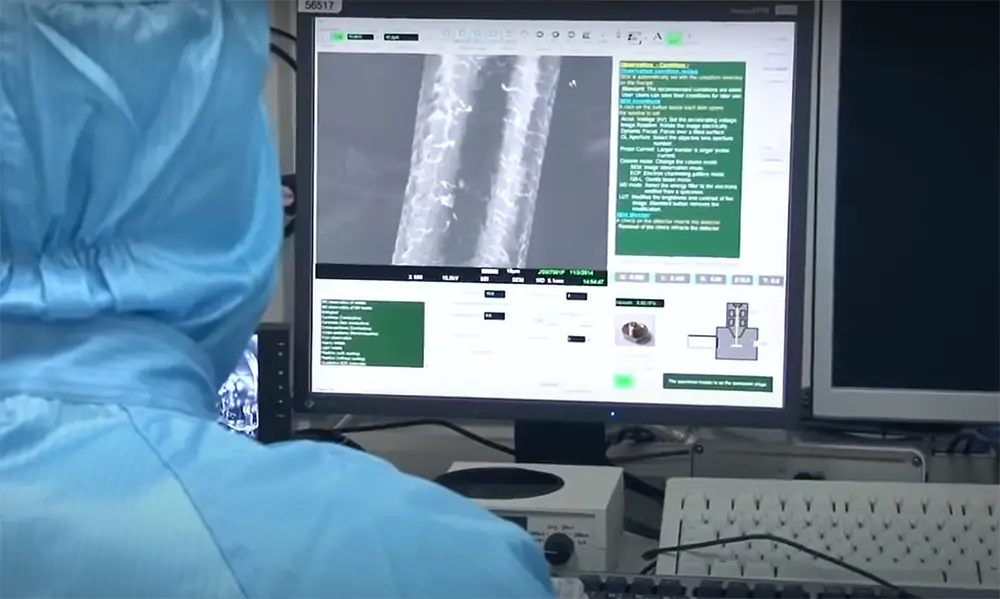If you are looking for a career that is constantly evolving and offers many opportunities for growth, then electronic engineering might be the perfect choice for you! Electronic engineers design and develop electronic equipment used in everything from cell phones to airplanes. If you are interested in learning more about this exciting field, keep reading! In this blog post, we will discuss what electronic engineering is and some of the exciting opportunities it offers.
What is Electronic Engineering?
In simple terms, electronic engineering means using electronics to create or improve products. Electronics engineers may work on components, systems, or devices that use electricity. They may also work on projects such as aircraft navigation systems, medical imaging equipment, and GPS devices.
This field also overlaps with computer engineering; the two disciplines are often combined into a one-degree program. Electronic engineers may work in a variety of industries, including telecommunications, automotive, aerospace, and manufacturing.

With the ever-growing demand for electronic products, there is a corresponding need for electronic engineers. This field is expected to grow at a rate of nine percent from 2016 to 2026, according to the U.S. Bureau of Labor Statistics. This growth is due in part to the increasing popularity of portable electronic devices and the integration of electronics into more traditional products, such as automobiles.
If you’re interested in a career in electronic engineering, you’ll need at least a bachelor’s degree in the field. Many electronic engineers also have a master’s degree or doctorate. You’ll also need to be proficient in math and science, as well as computer-aided design (CAD) software. Strong problem-solving skills are essential, as is the ability to think creatively.
Electronic engineering fields
There are many different types of electronic engineering, but some common fields include: [1]
- Consumer electronics
- Telecommunications
- Computer hardware
- Power engineering
- Robotics
- Embedded systems
- Radiofrequency
- Programmable logic
- Analog
- Consumer electronics include everything from the design of cell phones to home entertainment systems. For example, an engineer might work on the development of a new smartphone or create the schematics for a home theater system.
- Telecommunications engineers work on the infrastructure that allows people to communicate, including cell towers and fiber optic cable networks. Such engineers might also work on developing new types of communication, such as satellite systems.
- Computer hardware engineers develop the physical components of computers and other devices, such as circuit boards and processors. Workers in this field are often involved in developing new types of computer hardware, such as quantum computers.
- Power engineering deals with the generation, transmission, and distribution of electrical power.
- Robotics engineers design and build robots, which are increasingly being used in manufacturing and other industries. Robots can be used for tasks such as welding, painting, and assembling products. Or even to explore other planets, as in the case of Mars rovers.
- Embedded systems engineers work on the small, specialized computers that are found in many electronic devices, from cars to medical devices. Such systems often have to be designed to operate in harsh environments.
- Radiofrequency engineers work with electromagnetic waves, which are used for communications and radar. This means they might work on designing better antennas or developing new types of radar. In addition, radiofrequency engineers may also work on medical imaging devices, such as MRI machines.
- Programmable logic engineers design integrated circuits that can be programmed to perform different tasks. They are often involved in the development of new types of chips, such as those used in FPGAs. One more task of a programmable logic engineer is to create the hardware description language (HDL) code that defines the functionality of these chips.
- Analog engineers work with signals that are not digital, such as audio and video. For example, they may design amplifiers or audio systems. They also often work on developing new types of sensors, such as those used in medical imaging.

Electronic engineering is a broad field that encompasses many different specialties. These are just some of the most common types of electronic engineering. If you’re interested in pursuing a career in this field, there are many different options to choose from. Talk to an engineering advisor or research different programs to find the one that’s right for you.
Key functions of electronics engineers
Electronics engineers typically work in research and development, or they may be involved in production quality control. They design electronic circuits and components, oversee the manufacturing process, and test products to ensure that they meet performance specifications. In some cases, electronics engineers also install and maintain electronic systems. [2]
Some of their work may involve:
- Designing and developing new electronic components and products – they may also improve existing ones
- Analyzing data from tests and experiments to help guide the design process – means they need good mathematical skills
- Using computers to simulate how electronic devices and circuits will work, before any physical prototypes are built – this is called computer-aided design (CAD)
- Writing reports and documentation for colleagues, clients, or customers – usually, as part of a team, so good communication skills are important
- Supervising the work of technicians and other engineers – they may be responsible for organizing and supervising a team of other engineers and technicians working on a project.
- Identifying problems with existing products and designing solutions to improve their performance – this might involve coming up with creative solutions to solve problems
- Presenting their findings or ideas to colleagues – if they are working on a research project, they may need to present their findings to other engineers or write papers for conferences or journals
- Keeping up to date with the latest technology – this might involve attending conferences or reading technical journals. As technology changes quickly, it is important for electronics engineers to keep up with the latest developments.
- Carrying out feasibility studies for new projects, including costings and timescales – this might involve working with other engineers, such as mechanical or electrical engineers.
- Conducting research to identify new applications for electronic technologies – this might involve working with scientists from other disciplines, such as physics or chemistry.
- Testing finished products – it is important to identify any problems at this stage so that they can be fixed before the product is launched.
- Overseeing the manufacturing process – this might involve working with technicians and production managers to ensure that products are made to the correct specification.
- Installing and maintaining electronic systems – this might involve providing training to users, or writing manuals for operators.
- Writing usage recommendations for customers or clients – this might involve preparing reports or giving presentations.

Essential skills for electronics engineers
There are a few basic skills that every electronics engineer should have. These include:
- An understanding of electronic components and how they work – if you want to design and build electronic circuits, you need to understand what the different components do, and how they work together.
- The ability to use computer-aided design (CAD) software – is essential for creating accurate models and designs of electronic circuits.
- A good understanding of physics – many principles of electronics are based on physics, so a strong understanding of the subject is crucial.
- The ability to solder, desoldering, and breadboarding – these skills are essential for prototyping and testing electronic circuits.
- The ability to use test equipment – such as multimeters and oscilloscopes – is essential for troubleshooting and debugging circuits.
- Familiarity with schematics and PCB design – if you want to design and build your own circuits, you need to be able to read and understand schematics, and design PCBs.
- The ability to use microcontrollers – such as Arduino or Raspberry Pi – is essential for many projects in electronics.
- The ability to work with embedded systems – such as those used in drones or robots – is a valuable skill for many electronics projects.
- Basic coding skills in at least one programming language – while not strictly required, coding skills can be very helpful for many electronics projects.
- Basic soft skills such as problem-solving, critical thinking, and communication – while not strictly technical skills, these soft skills are essential for any engineer.
Should I become an electronic engineer in 2024?
This is a difficult question to answer. It depends on many factors, including your interests, abilities, and career goals. If you are interested in electronics and enjoy working with complex systems, then a career in electronic engineering may be a good fit for you. However, if you are more interested in mechanical systems or programming, then you may want to consider a different field.

There are many things to consider when making a decision about your career. If you are unsure about whether or not electronic engineering is the right field for you, talking to a guidance counselor or Career Coach can help you explore your options and make an informed decision.
The field of electronic engineering is very broad. It includes everything from designing and testing electronic components to developing new technologies. If you become an electronic engineer, you could work in a variety of industries, including telecommunications, automotive, aerospace, or consumer electronics. You could also work in research and development, or become a professor at a university.
FAQ
Is Electronic Engineering a good career?
There are many opinions out there on whether or not electronic engineering is a good career. The truth is, it can be a very rewarding and lucrative career if you have the right skill set and work hard. However, like any other career, there are also some downsides to consider. Here are some pros and cons of pursuing an electronic engineering career.
Which engineering is best for girls?
Many girls who are interested in engineering often choose electrical or mechanical engineering. These two fields are typically seen as more “traditional” engineering disciplines, and they offer a wide variety of career options. Girls who are interested in electronic engineering may want to consider pursuing a degree in this field, as it offers many unique and exciting opportunities.
Which engineering is best in the future?
There is no way to predict which engineering discipline will be the most in demand in the future. However, it is safe to say that all of the engineering disciplines will continue to be important as our world becomes increasingly technologically advanced. Electronic engineers who are able to stay up-to-date on the latest technology trends will likely find themselves in high demand in the future.
What are the disadvantages of being an engineer?
There are a few potential disadvantages to being an engineer. One is that it can be a very demanding and challenging profession. Engineers often have to work long hours, and they may need to travel frequently. Another potential downside is that engineers may not have as much job security as other professionals. This is because engineering jobs can be outsourced to other countries where labor is cheaper. Finally, engineers may need to take continuing education courses to keep up with the latest technology trends.
What are the advantages of being an engineer?
The advantages of being an engineer are many. Engineers typically have high salaries and good job prospects. They also often have the opportunity to work on interesting and challenging projects. Additionally, engineers can work in a variety of different industries, so they can find a field that matches their interests and skills. Finally, engineers often have the opportunity to work with cutting-edge technologies and make a difference in the world.
Useful Video: Why study Electronic Engineering?
Final Thoughts
Now you know a little more about electronic engineering and what it entails. If you’re interested in learning more about this fascinating subject, consider pursuing a degree in electronic engineering. It’s a complex and challenging field, but the rewards are well worth the effort.
In addition to a degree, there are many professional development opportunities available to electronic engineers. These include attending conferences, taking courses, and networking with other professionals. There are also plenty of online resources that can help you stay up-to-date on the latest developments in the field.
Overall, electronic engineering can be a great career for those who are interested in technology and have the right skillset. However, it is important to be aware of the potential downsides before making a decision to pursue this career. Girls who are interested in engineering should consider all of their options before deciding which field is right for them. No matter what engineering discipline you choose, it is likely that you will find a rewarding and challenging career.
So what are you waiting for? Start your journey into electronic engineering today!
And that’s it! We hope this article has helped shed some light on electronic engineering and what it entails.
References:
- https://www.electronics-notes.com/articles/becoming-an-engineer/electronics-engineering/what-is-electronic-engineering.php
- https://www.indeed.com/career-advice/finding-a-job/what-is-electronics-engineering






 Electronic engineering is all about harnessing the power of electronics to innovate and enhance products, from intricate components to cutting-edge systems. It’s a dynamic field, where engineers craft everything from aircraft navigation systems to medical imaging devices. Often closely tied to computer engineering, it offers a diverse range of career opportunities across industries like telecommunications, automotive, aerospace, and manufacturing.
Electronic engineering is all about harnessing the power of electronics to innovate and enhance products, from intricate components to cutting-edge systems. It’s a dynamic field, where engineers craft everything from aircraft navigation systems to medical imaging devices. Often closely tied to computer engineering, it offers a diverse range of career opportunities across industries like telecommunications, automotive, aerospace, and manufacturing.







Leave a Reply